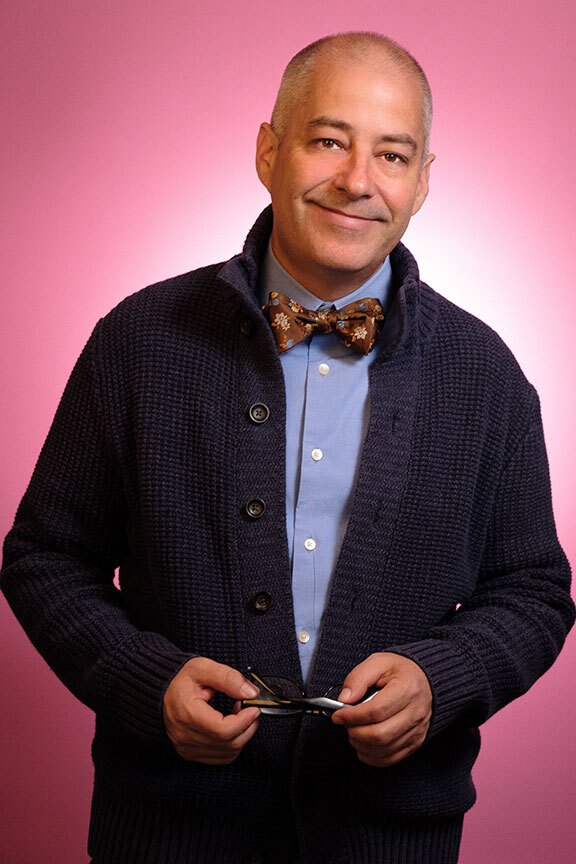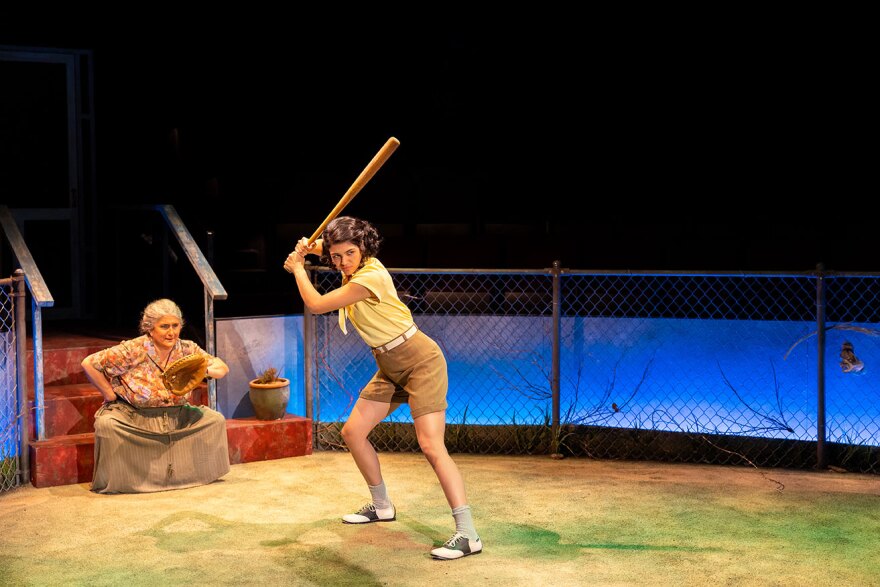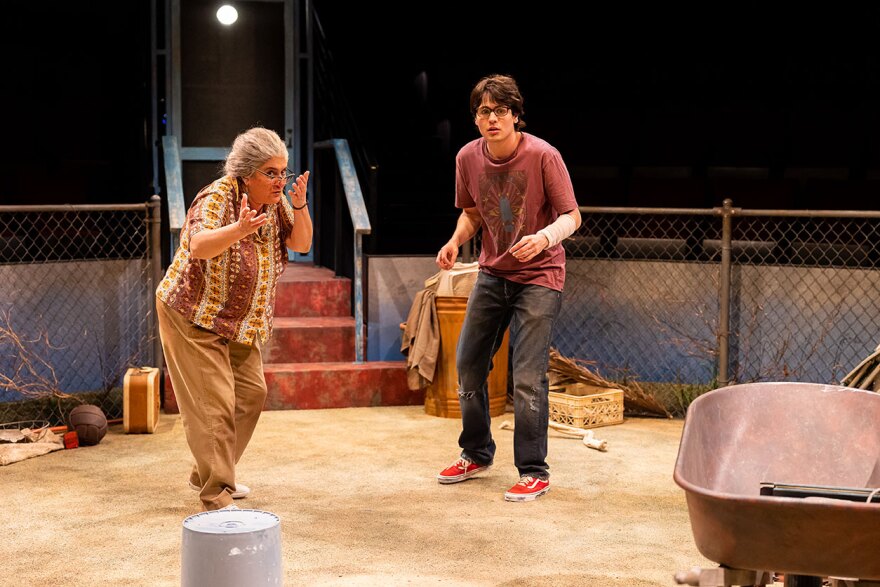"Under a Baseball Sky" is a world premiere play commissioned by The Old Globe, rooted in the Globe's "Powers New Voices" playwriting program. The play is about baseball and it centers on a friendship between two characters: young Teo and his elderly neighbor Elí. The setting is inspired by the Logan Heights community in San Diego,
Playwright José Cruz González and director James Vásquez previously worked together on the 2018 play "American Mariachi."
González and Vásquez joined KPBS Midday Edition to discuss the play and the production, which opens Feb. 16 and runs through Mar. 12 at The Old Globe.
José, why did you choose sports, specifically baseball, for a play?
González: I chose baseball and community to tell this story. For me, baseball is such an Americana thing in terms of its roots and those roots also connect with the immigrant community here in the United States. And I thought, "there's a story there and it's now" — I had to find it.
In my research, when I began to look into it, I realized that there wasn't a whole lot of information about our Latinx community and baseball. When you listen to Ken Burns and watch his documentary on baseball, we really don't exist. And I thought, "I want to talk about that." As I dug into it, I began to realize it was much more than just baseball.
So that journey would eventually send me down to San Diego where I would encounter this community in Logan Heights that really represented a lot of communities across this country, and how baseball played an important part in those communities.
And James, what is your connection to baseball?
Vásquez: Oh gosh, I grew up playing baseball. My dad is many, many wonderful things — a teacher, a poet, and a baseball coach. He was one of my very first baseball coaches starting with T-ball and I played up until I was about 12 and then I broke my father's heart when I discovered tap shoes and transitioned into the theater. But we watched baseball all the time growing up — to the point that I don't know that I ever had a favorite team. We just watched the game and loved it. So it's been a part of my life always.
The setting is based on the Mexican American community in San Diego's Logan Heights. James, can you talk a little bit about Logan Heights and what it is about that place that's connected in this work?

Vásquez: I grew up here in San Diego and — again connecting with my father — my father was a part of an organization when I was a child called Community Arts Center and it brought artists from all over the country, but primarily San Diego. I spent a lot of time down in the Logan Heights area, in the downtown area, just celebrating that community and the arts in that community. So I really grew up watching a community build itself and support each other in that growth of itself.
Logan Heights and Barrio Logan — I mean talk about roots in San Diego. Those communities celebrate what San Diego is about. And we got to take our cast to Logan Heights for a field trip, a very short field trip, but just to get a little sense of what that community was like. I think what we all came back with was celebration. Walking through Chicano Park and seeing those murals — it was about honoring and celebration. We went and got pan dulce and talked to the men who ran the shop and it was about celebration and each other. So I think that's really what we're wanting to celebrate with this story.
And José, San Diegans will recognize this community. But as you wrote it, were you imagining how the play would be received in other cities?
González: Yes, I've been blessed to travel across this country to many communities and to see how these immigrant communities were planted in terms of community arriving there to find work and of course raising their families and their children becoming part of the American fabric.
And I found that common thread of baseball as well as union organizing — one of the interesting things is that the employers of these canneries and packing sheds thought, "Let's teach our immigrant workers about working together and teamwork and things like that." And out of that evolved these communities playing baseball — the children growing up learning that game on the weekends where Sunday would be the day of church family and baseball. And that was happening all over the country and as these workers would play one another (on) different teams. They start to go, "What do you make over here at your job? And I'm making this and that." And out of that, this really interesting thing began to happen as union organizing started happening.
So there was something really, to me, appealing about looking at it, looking through the lens of baseball, but through the lens of an immigrant community. As James was saying, celebrating that history and and that tenacity of carving out a world, a life for their families, wherever these stories took (place) — the inspiration, of course, was Logan Heights because it really was the place that I came to when researching the play.

And a friend of ours, Mária García, took the time to give us a tour and history lesson about Logan — the community, its workers, its families and baseball. Out of that, the pieces of the story began to form. And taking that information, that knowledge and then applying that to the other stories and the other communities across the country, this became a composite of, you know, just the story itself and so it's just been such a great honor to be able to tell this story here in San Diego at the Globe with Logan Heights just being just down the hill from the theater. It's been really exciting.
Vásquez: José was talking about honoring the community and the history, and I think throughout the country we are seeing historic parts of our cities — re-gentrification is coming in and taking over. We're losing our history and I think that's one of the beautiful things about this show is (that it) honors San Diego, and who we are, and where we come from, and what makes this city great — it's the people and the communities and that history.
This play follows two main characters, a younger one described as a troublemaker and his elderly neighbor. José, can you tell us about these two, and why you chose this intergenerational friendship at the heart of the story?
González: We have a 16-year-old boy who's got in trouble at school and it's just devastated him for so many reasons. And of course you have this elderly neighbor — really sort of the foundation of that community, one of the earliest arrivals — fleeing a war in Mexico, coming to this community and being really its mother hand, if you will, of helping to keep a community vibrant, and alive and thriving. But there's a cost to her adopting this community and helping raise it. So these two wounded souls are sort forced together, and they do not get along at all which causes all sorts of sparks in our story.

But one of the common threads that these two find is baseball — their love of baseball. And it's through that lens that they find friendship. And in that friendship, they also find healing.
To me, that's been the beauty of this story. And of course the way James has cast this with some remarkable, talented artists in this cast — particularly these two folks, the young boy and and the elderly woman. It's just magical to watch them on stage and the chemistry and the electricity that emits. You're with them at every step of the way in this performance. And what a gift that we have them all in this — and again with James' magical touch as a director. It just continues to illuminate each night as we've been in our previews, watching an audience just get electrified by the performances and the story.
How do you stage a play about a game that you really can't play indoors, James?
Vásquez: Oh gosh with lots of theater magic and imagination. I love working in the round. I think it's one of the most magical creative spaces to tell a story in, and this play — José has written a wildly beautiful and in some ways cinematic story. I have loved that challenge of finding a way in the round to tell this story and make it flow, and make it dissolve into each other and really move forward and within the baseball game. I mean, come see it because we transform this stage throughout the course of the play into a baseball field and the game happens. You know, we're throwing pitches. We're hitting balls. We're striking people out and we're having a blast doing it.









